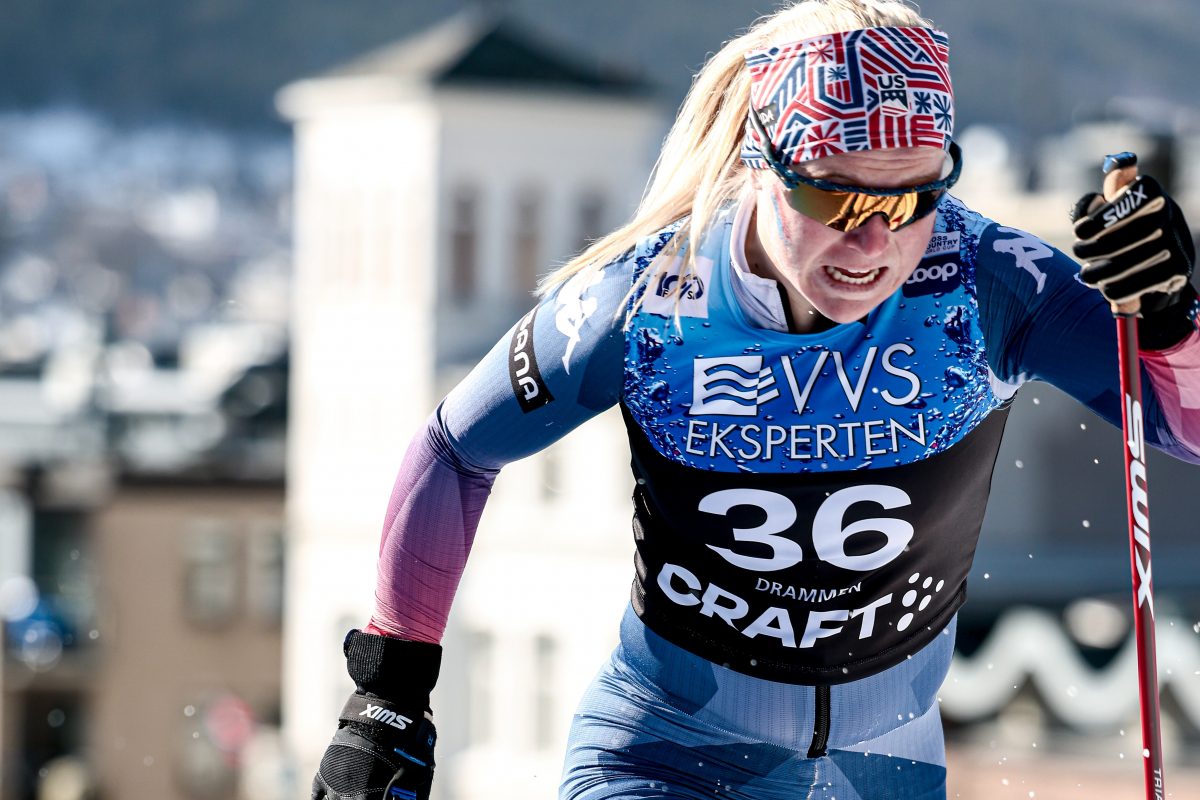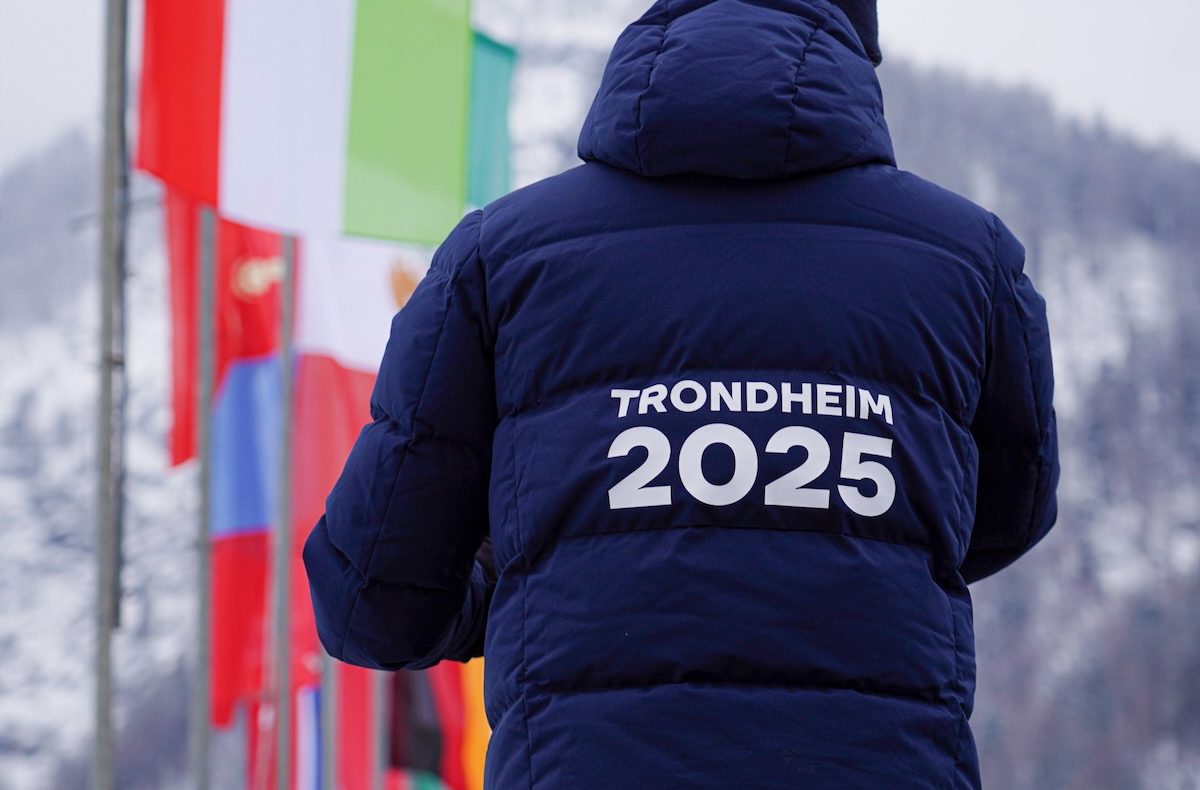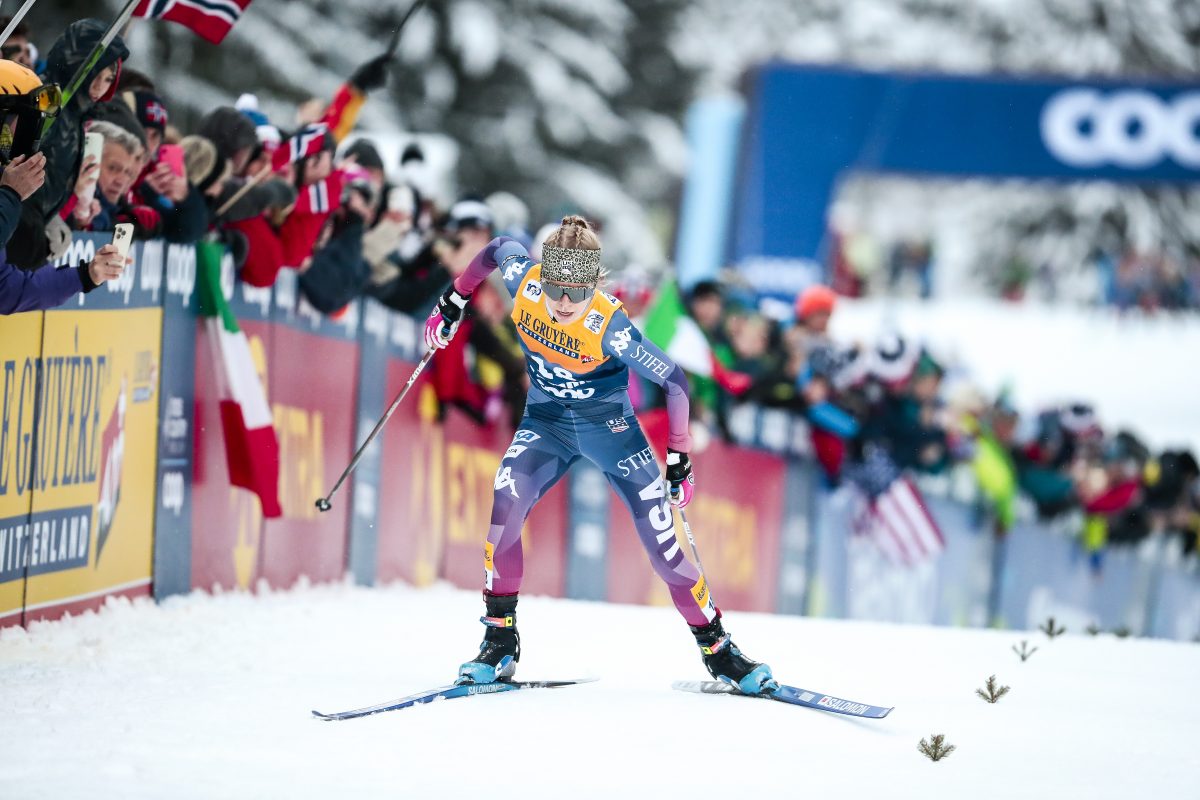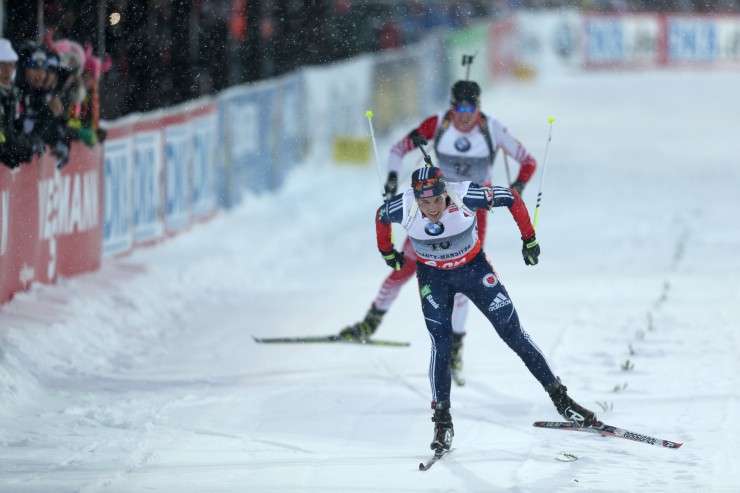
What a difference a day makes.
In Saturday’s 12.5 k pursuit, Martin Fourcade of France – who had already wrapped up biathlon’s overall World Cup title by a huge margin – looked decidedly unlike himself, missing five shots and missing the win.
“It was great to see that Fourcade is indeed human,” U.S. biathlete Tim Burke wrote in an e-mail to FasterSkier after that race. “Biathlon is a crazy sport and anything can happen in a race. I am looking forward to one more chance tomorrow!”
But come Sunday, Fourcade was putting those missteps behind him. In the 15 k mass start, he was once again the unstoppable force to be reckoned with that has had competitors quaking in their boots all seasons. Instead of those painful five penalties, Fourcade only missed one of his twenty shots. That meant that he was never far from the lead.
Even after the second stage, when that penalty loop knocked him back 18 seconds and he slipped to seventh, it took him only 1500 meters to make up the gap and rejoin the lead pack. Now that’s some skiing.
“It was a lot of fun – it was almost perfect,” Fourcade said in the post-race press conference. “This year every time I won a globe I did it with a victory, so I am really proud. And today I had to do it to win the last crystal globe.”
The win gave Fourcade something almost unprecedented: he won all of the titles available, from the overall to each of the four discipline globes. The last person to do that was another famous Frenchman, Raphael Poirée.
“I am really proud to join Raphael Poirée, who was the only one to do it before,” Fourcade said. “I’m really happy to be close to this great champion. He was my idol when I was young.”
And despite the focus that it took to get him here, Fourcade made sure he enjoyed the moment, too. He took his time skiing the French flag down the homestretch to the cheers of the crowd.
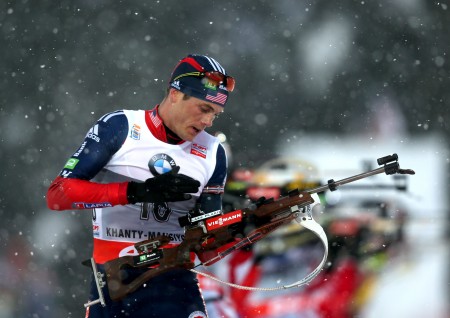
“I really enjoyed it,” he said. “It was really pleasant, the whole race. We all know that it’s the last World Cup of the season and it’s a special moment, because you have to look forward to the next season, but also look back, too. It was a lot of emotions today.”
By the time the racers had shot the fourth time, Fourcade was on his own. But a little over 30 seconds back, there was plenty of fighting still to be done. A pack of five men all left the range more or less together.
Anton Shipulin of Russia led the way. He had been the only one to keep pace with Fourcade through three laps, but missed a shot in the last stage. As he exited the penalty loop, he was joined by Simon Eder and Dominik Landertinger of Austria, Emil Hegle Svendsen of Norway, and Burke, who was, as planned, making the most of his last start of the season.
“Unfortunately, the last loop turned into a lot of tactics because it was so windy and no one wanted to lead,” Burke wrote in an e-mail to FasterSkier and USBA. “I don’t normally like sprint finishes but I had no choice today.”
Shipulin fell behind, and was even eventually passed by Simon Fourcade and Tarjei Bø. The other four bided their time, but not to the extent that the chasers could pass them. While the Austrians had teamwork, Burke had already demonstrated that he was among the fastest skiers this week.
Svendsen, meanwhile, had missed the previous two World Cup weekends and was recovering from being sick. He hadn’t been able to break into the top 20 in either of the previous races in Khanty-Mansiysk, and it was a question whether he would be able to race like himself – the man who had won two individual gold medals at World Championships, besting Fourcade.
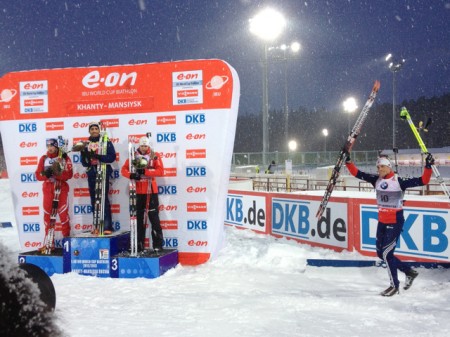
“The last few weeks have been really relaxing,” Svendsen said in the press conference, at least half seriously. “After World Championships I was just lying in my bed and lying on the coach for three weeks. It’s not the best to come here after that, but for sure it was nice. I was enjoying every minute that I had to myself while others were struggling on the slopes.”
Nevertheless, Svendsen had powerful motivation to do well. He’s not used to sitting on the sidelines, and willed his way around the course.
“I wanted to have a good result in the last race,” Svendsen said. “The sprint and the pursuit were really bad, so I just tried to stay with the leaders. But for sure my shape is the worst I have ever been on the World Cup, so I only raced with my head, not my body.”
Would he be able to pull off a sprint like he did at World Championships and beat the others?
Burke, too, was hoping he could maneuver his way to the front.
“Man, I wanted that podium so badly,” he told the IBU news service at the finish line.
But in the end it was Landertinger who got a bit of a jump and snuck away to second place, four seconds ahead of the others. It was a nice reward for the Austrian, who along with the rest of the Austrian team had suffered through several sub-par seasons before this one. He had also gotten knee surgery this summer, and was happy to be back at full strength.
On top of that, the race today earned him third place in the overall standings, passing Jakov Fak of Slovenia. The two finished separated by just six points after an entire season of racing.
“For me it is perfect after two bad seasons,” he said in the press conference. “I had a lot of good results—I am very happy to go home with this second place.”
Svendsen, not fast enough to win, did manage to outsprint Burke for third place, leaving the American with the wooden medal.
“There were a lot of us there,” Burke said. “It was really tough. I gave it everything I had, so that’s what it is.”
At least he can say that he pushed Svendsen to the limit: the Norwegian collapsed at the finish and had to be helped away from the course. With so few reserves to rely on, this was a particularly difficult race, he said.
“I was so dizzy when I got to the finish,” Svendsen told Norwegian broadcaster NRK. “I fainted for a few seconds and was suddenly completely gone. It was hell. My body is not quite used to doing it this way… it’s not such fun when you’re in bad shape. It was on pure will, and my shape is complete ass.”
One consolation is that the performance left Burke in third place in the mass start rankings; that goes with third in the individual rankings as well and tenth in the total score.
“Today was a great way for to cap of a memorable season,” Burke wrote in the e-mail. “I achieved all of my season goals with getting back to the podium, winning a World Championship medal and finishing in the top 10 of the overall. Now I am already looking forward to next year’s Olympic season!”
Lowell Bailey also had a strong race, turning in strong skiing to finish 14th despite a penalty in each of the last three stages.
After the end of the season, and such a successful one for these men, it’s time to relax. But also, to get ready for new goals, and to find new motivation.
“Now I, and I think all of the other guys, are focused on the Olympics,” Fourcade said. “It’s my last goal in biathlon, the last goal of my career. I’m only 24 but I… yes. It’s wonderful.”
When Landertinger was asked what his hopes were for next season, he confirmed that Fourcade was not alone in his aspirations.
“To run like Martin Fourcade,” he laughed.
Chelsea Little
Chelsea Little is FasterSkier's Editor-At-Large. A former racer at Ford Sayre, Dartmouth College and the Craftsbury Green Racing Project, she is a PhD candidate in aquatic ecology in the @Altermatt_lab at Eawag, the Swiss Federal Institute of Aquatic Science and Technology in Zurich, Switzerland. You can follow her on twitter @ChelskiLittle.

